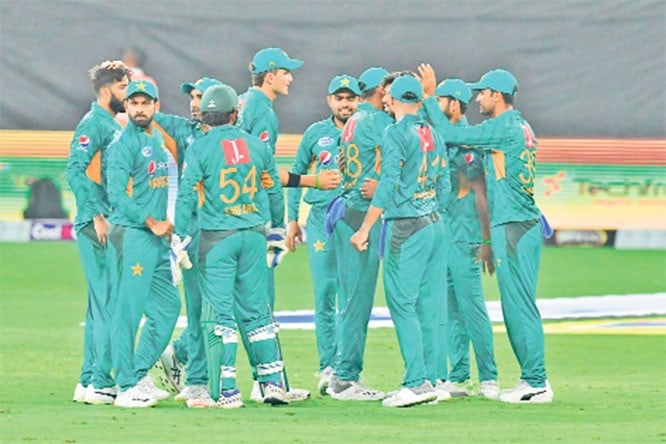
Pakistan’s series-winning triumph against Australia on Friday night means that they stay as the kings of the T20 format. But the victory shouldn’t hide the team’s many flaws

Just before the T20 contest, the Pakistanis managed to overcome a disastrous start to win the second and final Test against Australia at the Sheikh Zayed Stadium in Abu Dhabi to win the series 1-0.
The back-to-back series-winning triumphs mean that it’s been a good fortnight for Sarfraz. How his fortunes have changed. Just last month Sarfraz came across as a captain who wasn’t far away from losing the command of his troops. His performance in the Asia Cup, both as captain and senior batsman, was so bad that even his supporters were left wondering whether he was still good enough to lead Pakistan in all three formats of the game. It wasn’t just Sarfraz, who had misfired in the Asia Cup in the UAE last month when Pakistan suffered twin losses against India before crashing out of the six-nation contest after falling to Bangladesh in a must-win Super Fours game in Abu Dhabi. Barring a few exceptions, his entire team flopped miserably in a tournament after starting it as the pre-event favourites.
After the Asian Cup disaster, Pakistan’s series-winning triumphs against Australia must have come as a big relief for the national team, Pakistan’s cricket officials and fans. Pakistan were expected to win both the series against an Australian team that was without many of its stars but after what happened in the Asia Cup anything could have been possible.
Pakistan’s series-winning triumph against Australia on Friday night means that they stay as the kings of the T20 format. But the victory shouldn’t hide the team’s many flaws. That’s why instead of wasting too much time on celebrating it, Pakistan should work on finding ways and means to consolidate their line-up considering the fact that in about six months’ time they would be launching their title campaign in World Cup 2019 which gets underway in England in May.
Pakistan’s T20 squad might look in great shape but their One-day International combination is far from settled. India took full advantages of the gaping holes in Pakistan’s ODI armour in the Asia Cup. Bangladesh did the same and even minnows Afghanistan came dangerously close to causing what would have been a major upset.
Pakistan’s greatest cause of worry remains their batting line-up. Despite the rise of Fakhar Zaman as a dangerous pinch-hitter at the top of the order, Pakistan’s batting remains their weakest point. Time and again, they have shown an inability to post big totals. And when it comes to chasing, even a target of 250 seems as difficult a task for them as scaling Everest in bad weather. Over the years, Pakistan have shown heavy dependence on their bowlers to win matches. From where I see it, they would once again be relying on their bowling attack to see them through at next summer’s World Cup. It would be early summer in England and the conditions should suit Pakistan’s potent pace attack.
But World Cups can’t be won by one-dimensional teams. You have to have depth in your line-up to go all the way and win a tournament like next year’s World Cup. Unfortunately, Pakistan lack such depth in their batting. Mickey Arthur and others in Pakistan’s think-tank need to quickly work on that aspect otherwise the national team would be in danger of another Asia Cup-like debacle in England.
The team’s think-tank should be able to get valuable guidance from a powerful cricket committee that was formed by the Pakistan Cricket Board (PCB) last Friday. Headed by former Pakistan Test cricketer Mohsin Khan, the committee includes the likes of Wasim Akram and Mibah-ul-Haq. Three other former Test cricketers – Mudassar Nazar, Zakir Khan and Haroon Rasheed – will provide functional and administrative assistance to the committee as it carries out its work. All three of them are on PCB’s payrolls. Urooj Mumtaz, the former Pakistan women’s cricket team star, is also part of the cricket committee. The formation of this committee is the first major step taken by Ehsan Mani since taking over as chairman PCB last month. When I met Mani on the sidelines of the Asia Cup in Dubai, he stressed on the need of establishing a high-powered committee that could take care of the "cricketing side" while he can emphasize on the administrative side of the PCB.
It’s certainly a good idea to rope in former cricketers in a bid to better run cricketing matters. Soon after the Board announced forming the committee, Mani stressed the importance of the body by announcing that "nothing that happens in Pakistan cricket that this committee cannot look at". But at the same time, another top PCB official clarified that the cricket committee will not have any decision-making powers.
It’s apparent that in the shape of the cricket committee, Mani has installed watchdogs, who can keep an eye on key developments in Pakistan cricket. However, this step will only prove beneficial for the game if the committee works with complete sincerity and, perhaps more importantly, the Board pays heed to its advice. There might soon come a time when the committee turns up with suggestions that are not acceptable to top Board officials. What happens then? Ideally, if the committee makes sense then their suggestions should be accepted and action taken accordingly. Otherwise, the formation of this committee would be yet another addition to the countless useless steps taken by Board chiefs in the past.